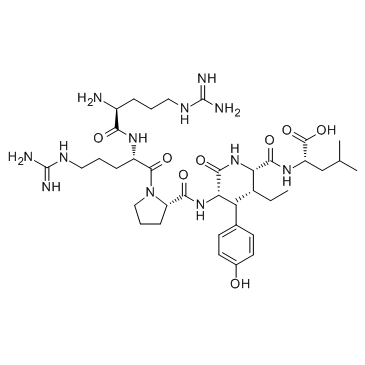| Kinase Assay |
Binding assays are performed on whole HT-29 cells at confluence. A day before the assay, cells (106 cells/0.4 mL, equivalent to 0.3 mg protein) are placed in 48-well plates. A special binding buffer that includes protease inhibitors (50 mM HEPES, 125 mM NaCl, 7.5 mM KCl, 5.5 mM MgCl2, 1 mM EGTA, 5 g/L bovine serum albumin, 2 mg/L chymostatin, 100 mg/L soybean trypsin inhibitor, 50 mg/L bacitracin, pH 7.4) is used for the experiments. In inhibition studies, cells are incubated for 1 h at 37°C in triplicate with 25,000 cpm of 125I-NT and variable concentrations (0.001-3,000 nM) of unlabeled NT(8-13), unlabeled NT-VIII, or NT-VIII labeled with natRe (final volume of 0.2 mL per well). The cells are then washed twice with cold binding buffer and afterward are solubilized with 1N NaOH at 37°C (0.4 mL per well). The activity is determined in a γ-counter. In saturation studies, cells are incubated in triplicate with increasing concentrations (0.1-10 nM) of 99mTc(CO)3NT-VIII for 1 h at 37°C (final volume, 0.2 mL per well). The concentrations of total technetium (99+99mTc) are equivalent to 0.2-20 MBq 99mTc activity per well. After 2 washings with the same binding buffer as before, the cells are then solubilized with 1N NaOH at 37°C (0.4 mL per well). The bound radioactivity is measured in the γ-counter. Nonspecific binding is determined with 1 μM unlabeled NT(8-13)[1].
|
